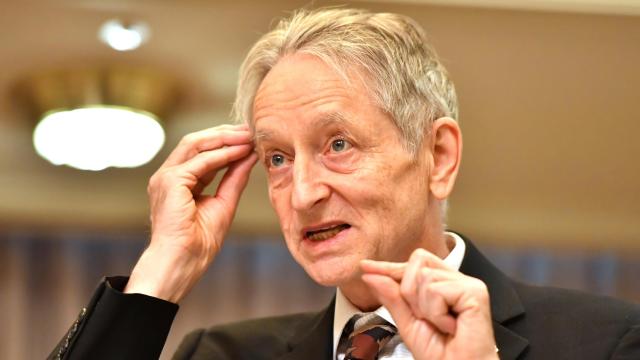Megalithic tech companies such as Google, Meta, and Microsoft are so obsessed with AI development it seems impossible to steer any of them toward slowing down and actually thinking about the repercussions. Now one of the most prominent faces in artificially intelligence research, former Googler Dr. Geoffrey Hinton, has come down hard on the full-spring pace of AI development, ultimately calling for some kind of global regulation.
According to an interview with The New York Times, Hinton, an award-winning researcher on AI, neural networks, and machine learning, is no longer so comfortable pushing the boundaries of AI development without any kind of regulation or stopgap. The 75-year-old Hinton, who was a lead researcher in any aspects of AI development at Google, has come out saying “It is hard to see how you can prevent the bad actors from using [AI] for bad things.”
He directly compared himself to Robert Oppenheimer, who helped develop the atomic bomb for the U.S. While Oppenheimer had made statements about pursuing science for sciences sake, Hinton instead said “I don’t think they should scale [AI] up more until they have understood whether they can control it.” He further shared his concerns that AI would lead to massive job disruptions around the world.
Hinton got his ‘Godfather’ title not with any offer you can’t refuse, but from decades of research on AI. This came to a head with the neural network he helped build in 2012 with two of his students at the University of Toronto. That network was a machine learning program that could teach itself to identify objects like dogs, flowers, and so on, and it became a major stepping stone for modern transformer-based AI like diffusion AI image generators and large language models.
Google had originally acquired the company formed out of Hinton’s Toronto-based research in 2013. This let him establish a Toronto-based element of the Google Brain team overseeing AI development. After that, Google went on an AI spending spree when it acquired deep learning company DeepMind in 2014. Hinton’s company, according to a 2021 Wired report, received numerous offers from tech giants including Microsoft and China-based Baidu, both of which are deep in the muck with their own push into AI development. In a March interview with CBS News, Hinton compared the recent rapid advancements in AI to “the Industrial revolution or electricity — or maybe the wheel.”
It’s unclear when Hinton made this heel-turn, but just a few months ago he was instead referring to AI as a “supernaturally precocious child.” He compared AI training to caterpillars feeding on nutrients to become butterflies, further calling OpenAI’s GPT-4 large language model “humanity’s butterfly.”
According to the Times, in April Hinton told Google he planned to leave, and finally cut the cord after a call with CEO Sundar Pichai last Thursday. Though The New York Times implied that Hinton had left Google in order to specifically take umbrage with his old boss, the Turing Award winner claimed he only wished to speak up on the dangers of AI, adding “Google has acted very responsibly.”
In the NYT today, Cade Metz implies that I left Google so that I could criticize Google. Actually, I left so that I could talk about the dangers of AI without considering how this impacts Google. Google has acted very responsibly.
— Geoffrey Hinton (@geoffreyhinton) May 1, 2023
Hinton’s departure comes at a time of massive reorganization at his former company after massive layoffs. Last month, Google announced it was consolidating two of its most major AI teams together. Combining the Google Brain and DeepMind teams into one unit and also reorganized its AI leadership, with Brain lead Jeff Dean being moved to a chief scientist position while DeepMind CEO Demis Hassabis is set to take control of all AI development.
So far, the overt calls for stalling AI development have come from outside big tech. In March, hundreds of leading minds and researchers circulated an open letter demanding companies pause advanced AI systems. The letter criticised how major tech companies were locked in an “out-of-control race to develop and deploy ever more powerful digital minds” that nobody could predict or control. Though that’s not to say folks inside these companies don’t have qualms. A recent report from Bloomberg claimed that people inside Google were especially concerned with the company’s Bard AI. Staff said the chatbot was so bad it was constantly providing misinformation and lies to users.
Want to know more about AI, chatbots, and the future of machine learning? Check out our full coverage of artificial intelligence, or browse our guides to The Best Free AI Art Generators, The Best ChatGPT Alternatives, and Everything We Know About OpenAI’s ChatGPT.
